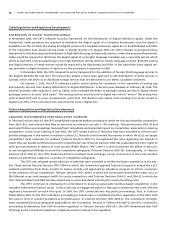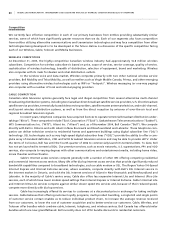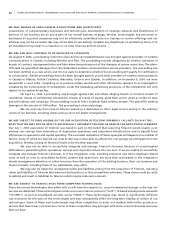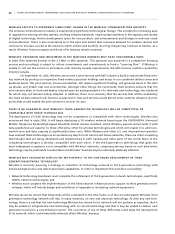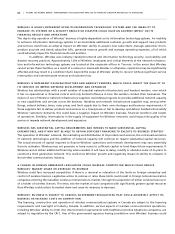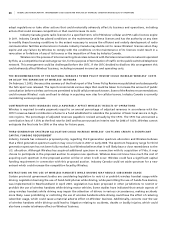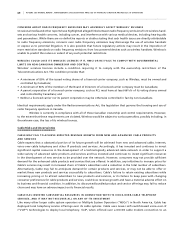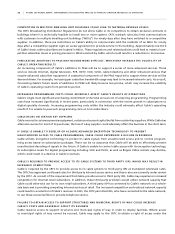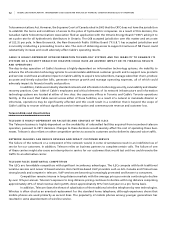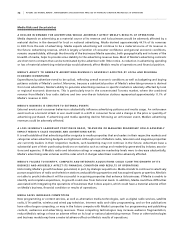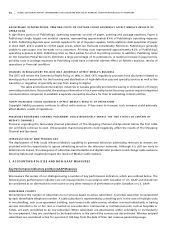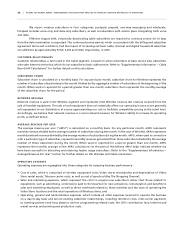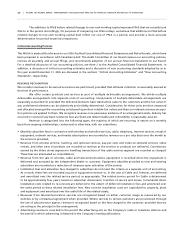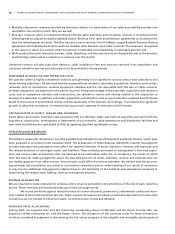Rogers 2005 Annual Report Download - page 72
Download and view the complete annual report
Please find page 72 of the 2005 Rogers annual report below. You can navigate through the pages in the report by either clicking on the pages listed below, or by using the keyword search tool below to find specific information within the annual report.
68 ROGERS 2005 ANNUAL REPORT . MANAGEMENT’S DISCUSSION AND ANALYSIS OF FINANCIAL CONDITION AND RESULTS OF OPERATIONS
adopt regulations or take other actions that could materially adversely affect its business and operations, including
actions that could increase competition or that could increase its costs.
Industry Canada grants radio licences for a specified term. All of Wireless’ cellular and PCS radio licences expire
in 2011. Industry Canada has placed conditions on the maintenance of these licences and has the authority at any time
to modify these licensing conditions to the extent necessary to ensure the efficient and orderly development of radio
communication facilities and services in Canada. Industry Canada may decide not to renew Wireless’ licences when they
expire and any failure by Wireless to comply with the conditions on the maintenance of its licences could result in a
revocation or forfeiture of any of its licences or the imposition of fines by Industry Canada.
Wireless is in the process of interconnecting its wireless network with the telecommunications network operated
by Fido, as a competitive local exchange carrier, for the purpose of termination of traffic on the public switched telephone
network. This arrangement could be challenged before the CRTC. If the CRTC decided to disallow this arrangement this
could adversely affect Wireless’ business, including increased income tax and operating costs.
TH E RE C OM M EN D A TI O N O F T H E N AT I ON A L W I RE L ESS TO W ER POL I CY RE V IEW CO U LD INC R EA S E W I RE L ES S ’ C O ST S
OR D EL A Y T HE E XP A NS I ON O F W IR E LE S S ’ N ET W ORK
On February 7, 2005, the executive summary of the final report of the Tower Policy Review was published and subsequently
the full report was released. The report recommends various steps that could be taken to increase the amount of public
consultation before wireless carriers are permitted to build cellular network towers. Some of the Review recommendations
could increase Wireless’ costs and lead to delays in acquiring new sites for cellular towers. Industry Canada is currently
considering various proposals.
CO N T RI B UT I ON R AT E I N CR E A SE S C O UL D AD V ER S ELY AF F EC T WI R EL E SS ’ RE S UL T S O F O P ER A TI O N S
Wireless is required to make payments equal to an annual percentage of adjusted revenues in accordance with the
CRTC’s revenue-based contribution scheme to a fund established to subsidize the provision of basic local service in high-
cost regions. The percentage of adjusted revenues payable is revised annually by the CRTC. The CRTC has announced a
contribution levy of 1.03% as the final rate for 2005 and has announced an interim rate for 2006 of 1.03%. Wireless cannot
anticipate the final rate for 2006 or the rates for future years.
TH I R D G EN E RA T I ON SP E CT R U M A LL O CA T I ON CO U LD I NC R EA S E W I RE L ES S ’ C O ST S A N D C R EA T E A SI G NI F IC A N T
CA P I TA L F U ND I N G R EQ U IR E M EN T
Industry Canada has released a proposed policy regarding third generation spectrum allocation and Wireless believes
that a third generation spectrum auction may occur in late in 2007 or early 2008. The spectrum frequency range for third
generation spectrum has not been fully resolved, but Wireless believes that it will likely bear a close resemblance to the
U.S. allocation. Although Wireless has acquired additional spectrum in connection with its acquisition of Fido, it may
choose to participate in the proposed auction to acquire new spectrum. Wireless does not know how much the cost of
acquiring such spectrum in the proposed auction will be or when it will occur. Wireless could face a significant capital
funding requirement in connection with this proposed auction. Industry Canada could set aside spectrum for a new
entrant which could increase the competition faced by Wireless.
RE S T RI C TI O NS O N T HE US E OF WI R EL E S S H AN D SET S W H IL E DR I VI N G M AY R ED U CE SUB S CR I BE R US A GE
Certain provincial government bodies are considering legislation to restrict or prohibit wireless handset usage while
driving. Legislation banning the use of hand-held phones while driving, while permitting the use of hands-free devices,
was implemented in Newfoundland in April 2003. Legislation has been proposed in other jurisdictions to restrict or
prohibit the use of wireless handsets while driving motor vehicles. Some studies have indicated that certain aspects of
using wireless handsets while driving may impair the attention of drivers in various circumstances, making accidents
more likely. Laws prohibiting or restricting the use of wireless handsets while driving could have the effect of reducing
subscriber usage, which could cause a material adverse effect on Wireless’ business. Additionally, concerns over the use
of wireless handsets while driving could lead to litigation relating to accidents, deaths or bodily injuries, which could
also have a material adverse effect on Wireless’ business.


